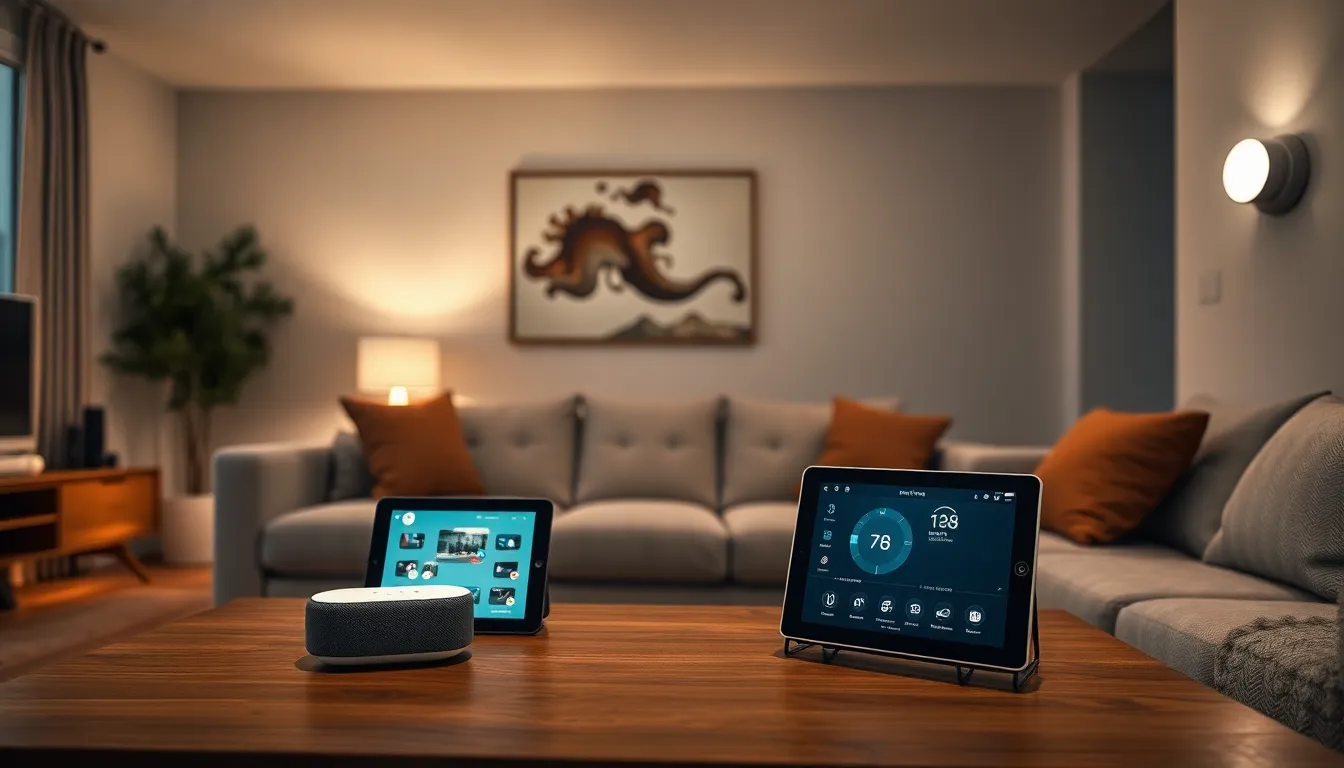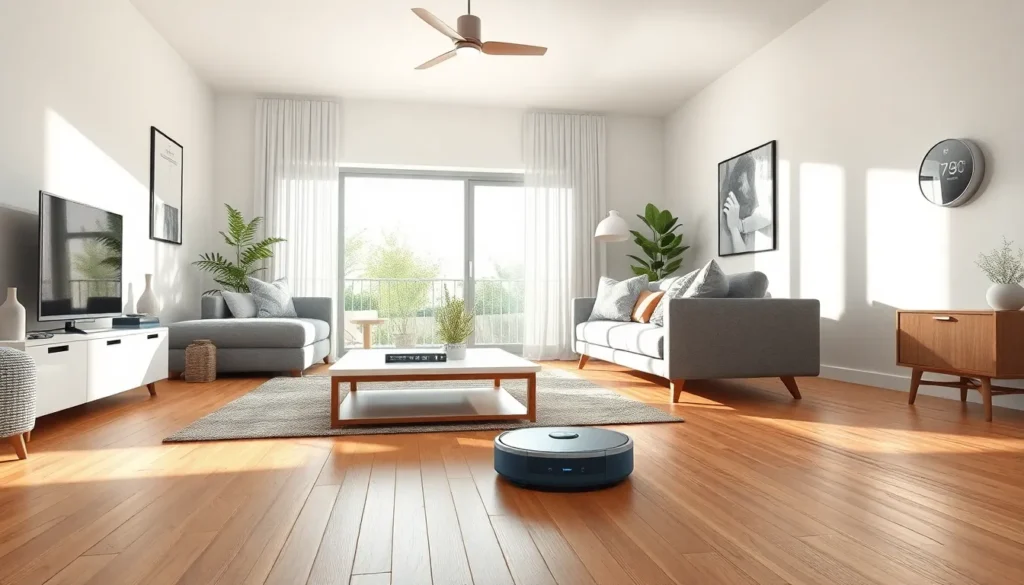Table of Contents
ToggleIn a world where smart fridges can tell you when to restock your favorite snacks, home lifestyle tech is transforming how people live. Gone are the days of fumbling with light switches or wondering if you left the oven on. With a flick of a finger or a simple voice command, homes are becoming smarter, more efficient, and—dare we say—way cooler.
Imagine sipping your morning coffee while your robot vacuum zips around, ensuring your floors are cleaner than your last attempt at cooking. Home lifestyle tech isn’t just about convenience; it’s about making life easier and a little more fun. From smart thermostats that know when you’re too hot to handle to security systems that keep an eye on things while you binge-watch your favorite shows, the future of home living is here, and it’s ready to impress.
Overview of Home Lifestyle Tech
Home lifestyle tech encompasses a range of smart devices that revolutionize daily living. Smart fridges, for instance, manage groceries and provide recipe suggestions. Robot vacuums automate cleaning tasks, navigating spaces efficiently. Smart thermostats optimize heating and cooling, learning user preferences over time.
Devices connect through the Internet of Things (IoT), allowing seamless communication. Control happens via mobile apps or voice assistants, enhancing user interaction. Energy savings become a reality with smart technology, as it efficiently manages resources.
Entertainment transforms with smart speakers and streaming devices. Smart TVs integrate web services, offering remarkable viewing experiences. Users access an array of content without needing multiple remotes or cables.
Security improves with smart cameras and doorbell systems. Monitoring occurs in real-time, generating alerts for unusual activity. Homeowners enjoy the peace of mind that comes with remote access to security feeds.
Tech integration expands beyond individual devices. Solutions like whole-home automation systems harmonize various gadgets. Users can create routines that match their needs, such as adjusting lights and climate when they arrive home.
Sustainability aligns with home lifestyle tech advancements. Smart systems help monitor energy usage, promoting eco-friendly practices. Homeowners actively contribute to a greener environment while enjoying enhanced comfort.
The future appears bright for home lifestyle technology. Innovations promise even more exciting features and functionalities. Lifestyle enhancements indicate that technology isn’t just about efficiency; it also elevates everyday experiences.
Smart Home Devices

Smart home devices revolutionize everyday living, offering increased convenience and efficiency throughout the home. They integrate seamlessly, allowing users to control various aspects of their environment.
Benefits of Smart Home Devices
Enhanced convenience stands as a primary advantage of smart home devices. Users control appliances, lighting, and security systems remotely, simplifying routine tasks. Energy efficiency represents another significant benefit; devices adjust settings automatically based on user habits, reducing unnecessary usage and lowering bills. Increased security also plays a crucial role, as smart cameras and alarms provide real-time alerts for unusual activity, ensuring peace of mind. Accessibility becomes another priority. Voice-activated assistants help individuals with mobility challenges manage their homes more effectively.
Popular Smart Home Products
Numerous smart home products cater to various needs. Smart thermostats, like Nest, allow users to optimize heating and cooling with ease. Robot vacuums, such as Roomba, take over floor cleaning, operating autonomously while users engage in other activities. Smart speakers, including Amazon Echo, enable voice command functionalities for music and information. Smart lighting systems, such as Philips Hue, provide customizable ambiance and control through an app or voice. Smart security systems, like Ring doorbells, allow homeowners to monitor entry points conveniently from their smartphones.
Home Automation Systems
Home automation systems streamline daily tasks and enhance comfort within living spaces. These systems offer a stylish and functional approach to managing various household activities.
Key Features of Home Automation
Home automation provides features that significantly improve daily convenience. Remote control of appliances allows users to manage devices from anywhere. Voice commands facilitate hands-free operation of smart lights, thermostats, and security systems. Seamless integration with other smart devices contributes to a cohesive home environment. Enhanced security options include real-time monitoring and alerts from smart cameras. Energy management features allow users to track and optimize consumption, promoting sustainability. Customization options enable the creation of personalized settings to suit individual lifestyles.
Leading Home Automation Brands
Several brands dominate the home automation market, each offering unique features. Google Nest provides smart speakers, thermostats, and security cameras, focusing on convenience and energy efficiency. Amazon Alexa connects various devices and enables voice-controlled automation. Philips Hue specializes in customizable lighting solutions that enhance ambiance. Ring offers advanced security products, including doorbell cameras that ensure home safety. Ecobee focuses on smart thermostats that learn user preferences for efficient climate control. These brands lead the way in innovation, making homes smarter and more responsive to daily needs.
Energy Management Technology
Energy management technology plays a crucial role in enhancing home efficiency and sustainability. Smart devices serve as powerful tools for monitoring and controlling energy consumption.
Smart Thermostats
Smart thermostats provide homeowners with optimal control over heating and cooling systems. By learning user preferences, devices such as Nest and Ecobee adjust temperatures automatically for comfort and savings. These thermostats utilize geofencing technology to detect when residents are home or away, ensuring energy efficiency. Remote access via mobile apps allows for adjustments from anywhere, contributing to overall convenience. Additionally, energy usage reports help users identify patterns and adjust settings, promoting awareness and further savings. This proactive approach to home heating and cooling translates to lower energy bills and reduced environmental impact.
Energy Monitoring Systems
Energy monitoring systems give real-time insights into household energy usage. Devices like Sense and Neurio track consumption patterns and identify energy-hungry appliances. Detailed reports reveal which devices use the most energy, allowing users to make informed decisions. Alerts for unusual spikes in usage help homeowners stay ahead of potential issues. Integration with smart home systems allows for automated adjustments, like turning off devices during peak hours. As a result, these monitoring systems contribute significantly to energy conservation efforts while enhancing overall home management.
Home Security Innovations
Home security technologies enhance safety and peace of mind for homeowners. Innovations in smart monitoring and alert systems create a secure home environment.
Smart Security Cameras
Smart security cameras provide real-time video feeds accessible via mobile devices. Features like motion detection, night vision, and two-way audio improve surveillance capabilities. Notifications alert homeowners to unusual activity, ensuring they can act quickly. Some models incorporate facial recognition to differentiate between family members and strangers. Brands such as Ring and Arlo offer reliable options with cloud storage for easy access to recorded footage.
Alarm Systems and Monitoring
Alarm systems utilize various sensors to detect unauthorized entry. Advanced systems integrate with smart home platforms for centralized control. Monitoring services provide 24/7 surveillance, often with immediate emergency response. Users can customize alerts based on their preferences, including smartphone notifications. Options like ADT and SimpliSafe offer flexible packages to suit diverse needs, ensuring families feel safe and secure at home.
Home lifestyle technology is revolutionizing the way people experience daily living. By seamlessly integrating smart devices into their homes, individuals can enjoy enhanced convenience and efficiency. The ability to control various aspects of their environment not only simplifies tasks but also enriches their overall lifestyle.
As innovations continue to emerge, the potential for increased functionality and personalization is limitless. Home automation systems will likely become even more intuitive and responsive, catering to unique preferences and promoting sustainability. With a focus on security and energy management, technology is transforming homes into safer and more efficient spaces, ensuring that modern living is both enjoyable and responsible.







